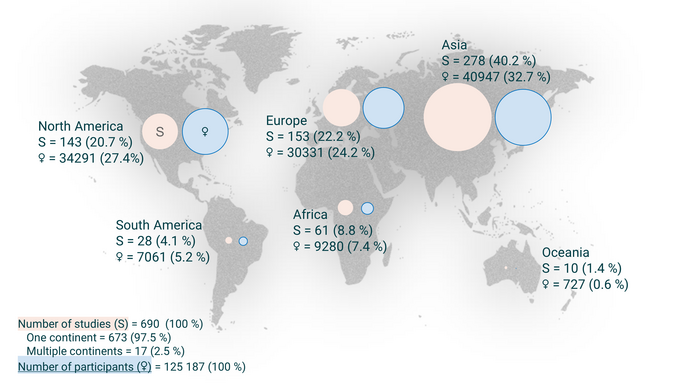A new paper published in Trends in Microbiology highlights significant geographical and socioeconomic gaps in vaginal microbiome research. The paper, co-authored by researchers from Swiss TPH, shows that only about 13% of vaginal microbiome studies focus on Africa or South America, leaving critical gaps in understanding vaginal health globally.

World distribution of the vaginal microbiome data studies (2019-2024).
In a new paper published in Trends in Microbiology, researchers call for a broader and more inclusive approach to vaginal microbiome research. The paper, which draws on microbiome studies from the past 5 years and incorporates insights from citizen-science initiatives such as the Isala Project, underscores efforts to broaden global research on microbiome diversity, and emphasizes the need to consider social, cultural and environmental factors that influence vaginal health.
Swiss TPH contributed with expertise on the social determinants of health and examined how historical biases in research have shaped global disparities in women’s health. “By integrating global perspectives, we can move toward microbiome-based health interventions that are relevant for all women, not just those in high-income settings," said Monica Ticlla, Postdoctoral Scientific Collaborator at Swiss TPH.
Understanding the vaginal microbiome
The Vaginal microbiome plays a key role in reproductive and overall health, influencing conditions such as bacterial vaginosis, preterm birth, urinary tract infections and sexually transmitted infections. However, most research has focused on high-income settings, limiting global understanding of vaginal health. The authors identify several critical issues that need to be addressed:
- Limited global representation – Many regions, including African and South American countries, remain underrepresented in microbiome research. The authors urge increased collaboration with researchers in low- and middle-income countries to address this imbalance.
- Limitations of current classification systems – The vaginal microbiome is often categorized into five community state types (CSTs) based on dominant bacterial species, but the authors highlight that this model oversimplifies microbiome diversity.
- The influence of social and cultural factors – The composition of vaginal microbiomes is shaped by more than just genetics. Factors such as hygiene practices, dietary habits and healthcare access play a major role in determining microbiome diversity.
- Rethinking treatment approaches – Bacterial vaginosis and other vaginal microbiome-related conditions are commonly treated with antibiotics, but recurrence rates are as high as 60%. Alternative approaches, such as vaginal microbiota transplants and live bio-therapeutic products, may offer more effective long-term solutions.
These issues reinforce the need for a fundamental shift in how vaginal microbiome research is conducted, ensuring that studies better reflect the diversity of women's health experiences worldwide. Ticlla emphasized the importance of expanding research beyond high-income countries, stating, "The vaginal microbiome influences health outcomes in ways we are only beginning to understand, and expanding microbiome research to diverse populations is essential for developing effective health strategies."
The Isala Sisterhood
A key part of addressing these gaps is the Isala Sisterhood, a global citizen-science initiative, aimed at improving representation in vaginal microbiome research. In Switzerland, Isala’s sister project, the Marie project, is led by Swiss TPH. The Marie project leads an international study with Isala Project and sister projects in Peru and Cameroon to understand the impact of menstrual health management on the vaginal microbiome. By fostering collaboration across different cultural and geographic contexts, The Isala Sisterhood enables researchers in low- and middle-income countries to develop local expertise while contributing to global microbiome data.
Contact

Monica Roxana Ticlla Ccenhua
Postdoctoral Scientific Collaborator
+41612848632
,
*
monicaroxana.ticllaccenhua@swisstph.ch
Restez en contact avec nous
Abonnez-vous à notre newsletter et recevez toutes les dernières nouvelles de la recherche, nos projets, cours et événements.